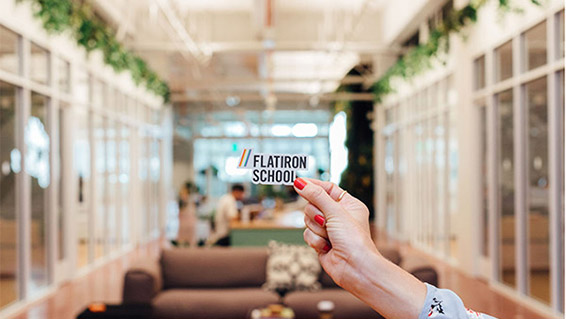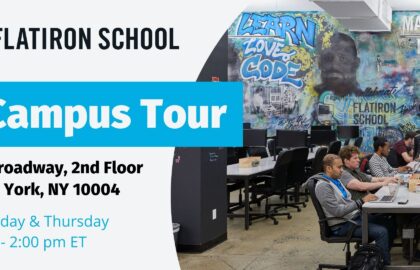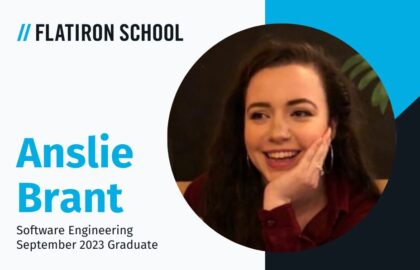When you think of tech, you often think of San Francisco, New York, and Austin—the United State’s bustling tech hubs. But, what if you’re interested in joining the tech industry without moving to one of these cities?
Tech is everywhere—and companies across all industries around the world need software engineering talent. If you’re interested in launching a career in tech, you have your pick of companies that vary in size, industry, location, and company culture.
But, what’s it like to work in tech in a city where the tech culture isn’t as well known nationally? We spoke with Maria Cristina, a Flatiron School alumna, who lives and works in Charlotte, North Carolina. Maria Cristina studied software engineering at Flatiron School in New York, but preferred to head South to build a life.
We connected with Maria Cristina about her life and career in Charlotte, how she transitioned from retail to tech, and her advice for learning to code.

What inspired you to want to make a change and begin a tech career?
I was attracted to the tech industry because of its constant evolution. I found it energizing that there are endless possibilities in this field and I could never know everything there is to know. I found that in tech, I could continuously build upon these skills and improve my personal capabilities.
Where were you working and what were you doing before Flatiron School?
I was working as an Assistant Buyer for a large retailer, buying beauty products.
How did you first become interested in tech and code?
I originally became interested through my brother, who is also a software engineer. He went through a bootcamp program about 6 years before I did. I was really amazed with what he was able to learn, create and how happy he was with his career. I wondered for a while if software engineering could be a good fit for me too so I slowly tried to test it out. I took a few online courses and attended a basic JavaScript class. I realized the class always flew by and by the end I wanted to keep working. I really loved it. This is how I knew I found a career that I would be really excited and passionate about.
Why did you choose Flatiron School?
The curriculum and culture. I knew I wanted a full stack course and ultimately wanted to find a school that aligned with my learning style so I could get the most out of the 15 weeks. I had taken the online prep course, so I was already familiar with Flatiron School’s test-driven development lab structure and felt this hands-on approach was beneficial for me. I wanted to be a part of a collaborative environment that allowed for open discussion that could facilitate new ideas or reiteration of key concepts and felt that Flatiron School fostered this type of culture through a combination of interactive classes, team discussions & pair programming.
Did you struggle with impostor syndrome? If so, what helped you overcome it?
Absolutely. I think most people do. When I feel this frustration, I try to reflect on how much I learned and challenges that I faced and overcame. Even If I don’t have the answer for a problem right now, I know that I faced a problem like this before and learned something from it. Instead of being overwhelmed by everything I don’t know, I focus on what I do. I try piece steps together and then fill in with research and Google.
Tell me about the community at Flatiron School.
I think the sense of community is something that really differentiates Flatiron School. The teachers and TAs are very knowledgeable and willing to help. All the students have a “we’re in this together” attitude, so we would often share ideas, and both help and learn from each other. We would often celebrate code challenge completions with a trip to Shake Shack, Korean bbq, or some other food choice.
What was your favorite moment during the course?
I have too many so I am going to name a few –
-
last day of Mod-3. Mod-3 focuses on javascript so a lot of students chose to make games for their final project. It was so much fun to play all the games that my fellow students and I had created. It was also really inspiring to see everyone’s creativity shine.
-
Last day of Mod-5 for similar reasons above, but this was for projects each student had spent 3 full weeks on. It was super rewarding to see hard work come to life and see how far we all came in 15 weeks
-
On the very last day, we rode the Seaglass Carousel in Battery Park.
What’s your favorite thing about software engineering/web development?
I find it really rewarding. It is both a personal skill and an industry that is continuously improving and evolving. Personally, I love being able to challenge myself and grow my knowledge and capabilities. Within the industry there is so much out there to know and there’s still so much unknown— and that makes software engineering a really exciting space to be a part of.
Did you find your previous experience has helped you excel? If so, how?
Working in retail taught me to focus on consumer behavior and customer experience, I believe understanding your retail customer helps translate to understanding your end user and developing UX with a thoughtful and empathetic approach.
What was the most unexpected thing you learned during the program?
That you don’t have to have a computer science degree or a previous job that directly relates to tech and code to excel. Most students are coming from various backgrounds and find common ground on perseverance, collaboration and thoughtful reasoning.
What advice would you give to people who are considering switching to a career in software engineering
I hesitated for a long time contemplating my career switch and I believe some fear prolonged my decision, but I wish it hadn’t. I felt conflicted because I had been going down one path and felt like all my time and hard work was going to waste, but on the other hand, I thought if I stayed in my current path, I was giving up on a dream I didn’t even give a chance, which overtime felt much worse. It helped me realize that the “right” career move isn’t always clearly defined and should stem down to what is right for you, your life, and your goals.
With that being said, It is definitely a difficult decision and a big investment to make so I would say –
-
Don’t let nerves or imposter syndrome stop you— if you WANT to do this, you are 100% capable
-
The people who put in the most time and effort are those who get the most out of the program and are most happy with their career switch so be prepared to give 110%
-
Reflect on your career and personal goals and ask yourself would this career switch help get you there?
-
Code! Code as much as possible on your own. There are so many online resources out there that are FREE (including Flatiron School’s prep-course). You won’t feel confident that this is a right fit for you unless you dedicate time to coding to figure it out.
What are the advantages of having a tech career in Charlotte? What makes the city unique to you as a software developer?
Charlotte is a really unique city because it’s one of the fastest growing cities in the U.S., so even though Charlotte doesn’t compare in size to NYC or San Francisco, there are lots of opportunities and businesses moving down here. It is also relatively a very ‘livable’ city where your money can go further. This might seem like an external factor to your career but I do believe it has a great influence on your ability to enjoy your day-to-day because the happier you are the easier it is to put time/effort to excel at your job.
What’s your advice to someone who is wary of moving away from a place like New York or San Francisco to begin their tech career?
I think there are pros/cons to every city and it really depends on what the individual is looking for in his/her career and life. New York and San Francisco are two amazing cities with tons of opportunities in tech, but they are not the only cities out there! Keep an open mind, and weigh the pros and cons of what’s most important for you.




